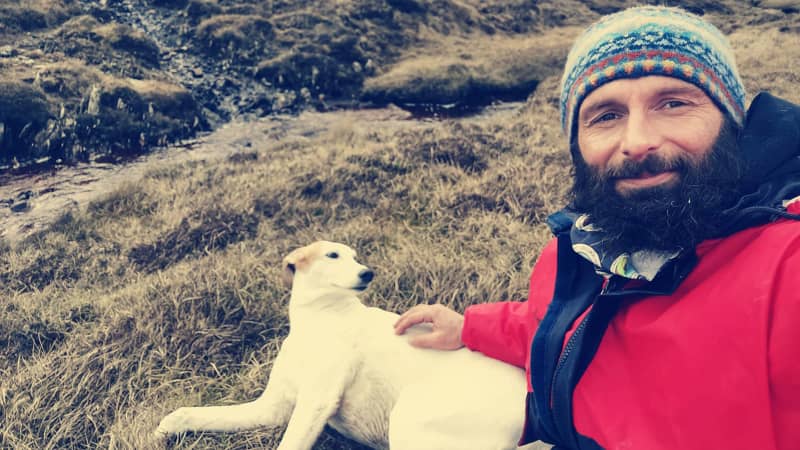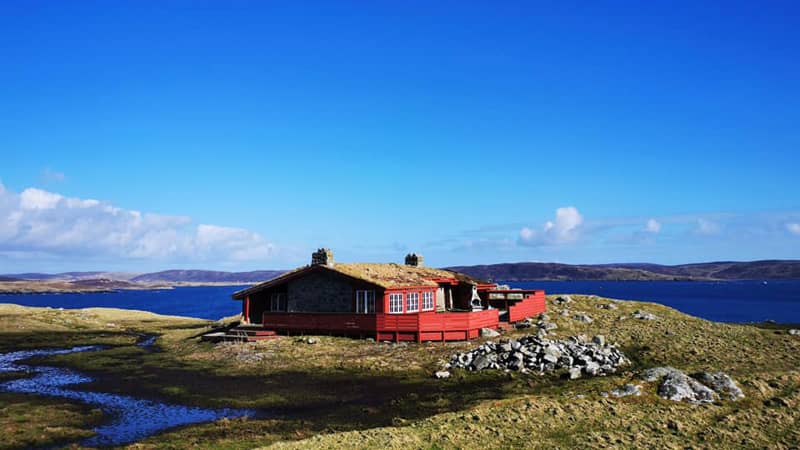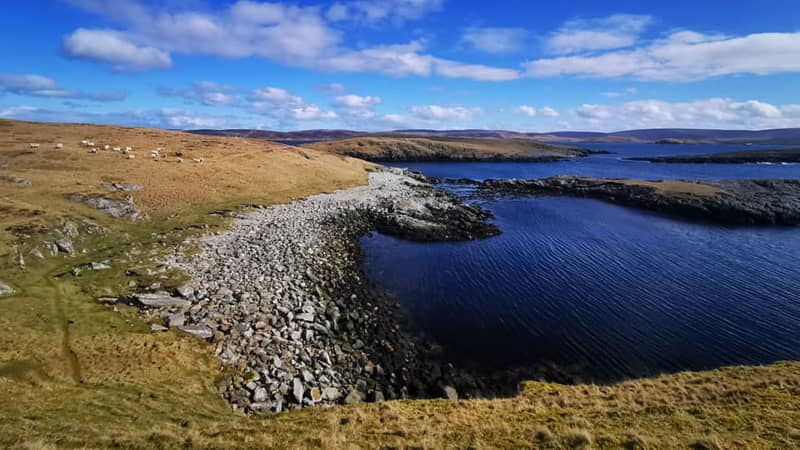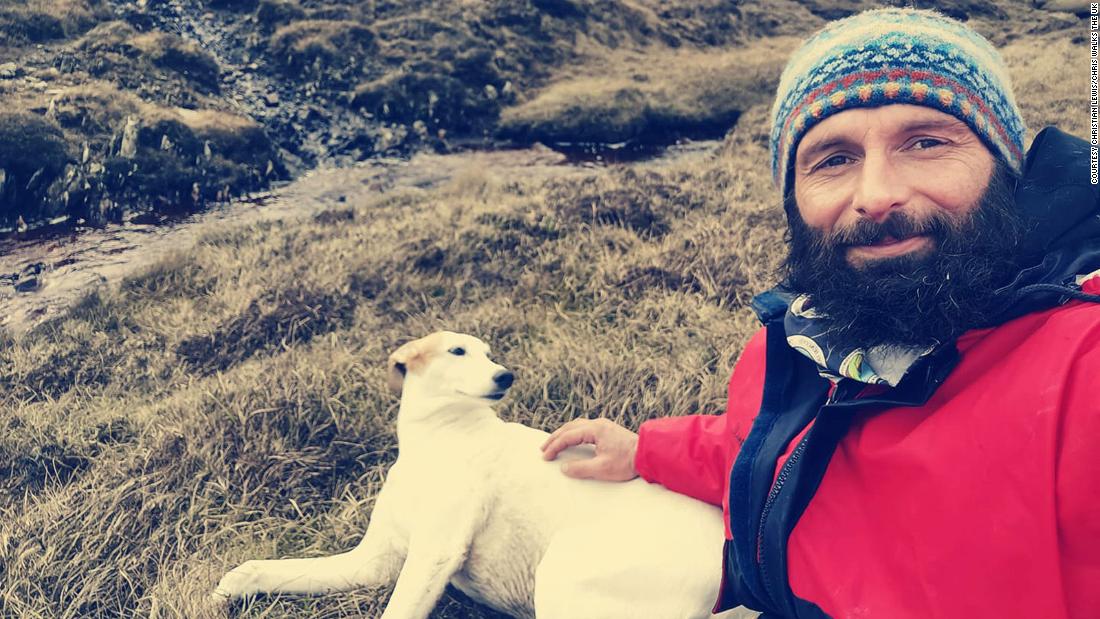(CNN) — What happens when you’re nearly three years into the middle of a 8,700 mile hike, you’ve given up your home, you have no money — and then coronavirus stops the world in its tracks?
That was the dilemma facing Christian Lewis when his quest to walk every twist and turn of the British coastline to raise money for charity was suddenly derailed by the arrival of the pandemic.
Lewis, from Swansea in South Wales, set off in the summer of 2017, with just $12 in his pocket. Picking up a companion — a dog named Jet — along the way, he arrived on the remote Scottish Shetland islands in March just as the UK was placed under restrictions.
With no home to go to and only a flimsy tent for protection in one of the most northerly and windswept parts of the country, he could’ve been in trouble.
Instead, thanks to the kindness of complete strangers, he’s found himself in arguably one of the best places on the planet to sit out the crisis — a cottage on a tiny island all to himself.
“It is just super. I couldn’t be in a better place for a lockdown,” Lewis tells CNN from Hildasay island. “There’s nothing here but a few sheep and an array of birds.”
One of the Scalloway Islands, Hildasay measures less than half a square mile and has been largely uninhabited since the late 19th century.
‘I couldn’t be in a better place’

Christian Lewis and his companion Jet are currently stranded on Hildasay island, located off the coast of the Shetland Islands.
Courtesy Christian Lewis/Chris Walks The UK
Lewis receives deliveries of water from local fisherman called Victor and forages for food. He makes the occasional boat trip to the Shetland mainland for other supplies.
“To get back to the mainland is only about a half hour by small boat,” he says. “But that stretch of sea is not the nicest, so we really have to pick and choose our days when we get back.”
While there, he decided to walk the coast of Northern Ireland, before returning to Scotland, including Shetland archipelago, which lies in 100 miles north of the mainland, deep in the North Atlantic.
Lewis was close to completing the Shetland Islands, which has 300 islands and skerries, of which only 16 are inhabited, when he learned he could go no further because of coronavirus restrictions.
While he managed to avoid ongoing news reports about the pandemic on his travels, he’d picked up various bits of information from people he’d encountered while walking.
Island life

The pair were given the keys to this house after the owners learned they were camping on the uninhabited island.
Courtesy Christian Lewis/Chris Walks The UK
“I knew the lockdown was coming,” he explains. “I had to make a real decision. I can’t go home, because I have no home to go to.
“So with the help of some fellow Shetland people, who lent me a boat, I came to the island and started living off the land.
“I can walk down now, and I’ll have a whole plate full of mussels if I want them, so I’ve got no worries there.”
Although he was originally staying in a tent, Lewis was later given the keys to an empty house after news that he was camping on the remote island spread to its owners, who were happy to help.
“It hasn’t got electric or gas,” he says. “It’s just very basic. But it’s out of the wind, and it’s got a nice fire.
“We’re (he and Jet) going to be here for the foreseeable future.”
The UK government also advises to remain “two meters apart from anyone outside of your household,” something Lewis need not worry about while being a boat ride away from any form of human contact.
While he’d be forgiven for being disappointed his ambitious trek has been put on hold indefinitely, Lewis is taking a laissez-faire attitude to the whole thing, which is how he’s approached the walk since the beginning.
He packed up and left Wales just days after deciding to take on the challenge following years of difficult times “since returning to civilian life,” upon leaving the British Army’s Parachute Regiment.
“I suffered really badly with anxiety and depression [in the past],” he explains. “I knew I really needed to change something, so it really was a split-second decision.”
“I’d had a lot of help from Ssafa, so it was a no-brainer to go and do something to help them out, and we’re doing really well so far,” adds Lewis.
“I made the decision and within days I was gone. I really didn’t think about it too much and that’s probably why I’ve done so well in terms of how far I’ve got.”
“I started the journey on my own, but I picked Jet up along the way [in Irvine, Scotland] and basically adopted her.
“She’s been with me for nearly two years now. I don’t think there’s a better walked dog out there.”
Halted walk

Hildasay spans an area of 108 hectares and is 32 meters at its highest point.
Courtesy Christian Lewis/Chris Walks The UK
“The more I got into the journey, the more people heard about it. And they started wanting to help us in different ways,” he says.
“People have been helping me and Jet with food and just offering their services in any way they can.
“It’s really lovely to see the kindness we’re receiving. I never expected any of this when I started it — I thought I was going to be living off bugs for the next two years.”
Rather than bugs, Lewis eats a lot of stews, vegetables as well as any shellfish or crab he can find.
“If I can, I’ll carry meat,” he adds. “People always ask me how heavy my backpack is. I have no idea, but it’s heavy.”
While Lewis had roughly estimated the challenge would take two years, it’s been a longer process than he originally anticipated.
“It’s taken me nearly two years to finish off all the [Scottish] islands, because they’re just so barren and hard work, especially during the winter,” he says.
“But Jet takes it all in her stride. We have got quite a unique relationship because we’re never apart from each other. She sleeps in my sleeping bag.”
But after walking every day for so long, is Lewis running out of momentum now he’s holed up on a deserted island? Far from it.
“Although I’m not walking or making progress on the coast, I’m not stopping the journey,” he stresses.
“As soon as this [the coronavirus pandemic] has passed and the UK has come out of lockdown I’ll get straight back to where I stopped, on the coast of mainland Shetland, and continue.
“It won’t be long until I’m back on the mainland and heading down to the east coast.”
Lewis is keeping active by setting himself new challenges as often as he can.
“I’m still going to walk,” he says. “Maybe I’ll walk around the island 15 times in a day.”
He also completes a “Rocky-style” training regime, that involves throwing rocks around, every now and then in order to work on neglected body parts.
“Doing the same movement every single day does start to take a toll,” he says. “I noticed I was slowing down, so I did it [the training routine] this morning.”
Like many of us, Lewis is also finding being forced to stay put for a while has meant he’s been able to do some of the things he’d never usually get around to, such as reading up on subjects he’s interested in, but had put to one side as he was too busy walking.
And while he’s spending this lockdown period many miles away from his hometown, Lewis says he feels encouraged by the way people are using their time during what is a very difficult period of time for much of the world.
Self-isolation benefits
“I see a real change in things,” he says, explaining he’s been keeping up to date with developments back in the UK via his social media feeds.
“People are putting videos of them doing stuff with their families, being creative. I’m seeing more musicians out there.
“And I think the good side of this that’s coming out is that people are actually coming together. And that’s beautiful, isn’t it — that’s just lush.”
Of course, Lewis is well-practiced in self-isolation, and attests that separating himself from the daily stresses of the modern world has completely turned his life around.
“I think isolating yourself from that kind of thing can really help your mental health,” he adds.
“It certainly helped my life. It’s one thing to be doing it in the house, but me and Jet have been doing this for quite a long time now.”
While his time in Scotland has proved grueling, he’s enjoying it immensely, benefiting greatly from the destination’s access legislation, which makes it possible to camp almost anywhere.
“Pitching my tent in some of the places that I have. At times it really does feel like there’s not been many humans around for a very long time,” he says.
“There’s something very spiritual about it. I’ve learned a lot about myself from camping around the UK.
“It’s very epic, in many, many proportions.”
While he admits he misses his family, particularly his daughter Caitlin, who had left for college when he began his trip, Lewis has never been tempted to give up and go home.
“I get visits from my family every now and then and my daughter will come up and see me. So that’s all I need,” he says.
For the moment, Lewis has no choice but to stay in Hildasay, and says he’s enjoying every minute of it, despite the fact the winds are pretty brutal and in the last weeks of winter it was dark by around 3 p.m. every day.
“I don’t know when I can continue the journey,” he admits. “I think it will be about another year and a half before I finish, but who knows?
“So I’m going to sit on this island and learn more stuff. And I’ll keep posting, because I know it makes other people smile.”
